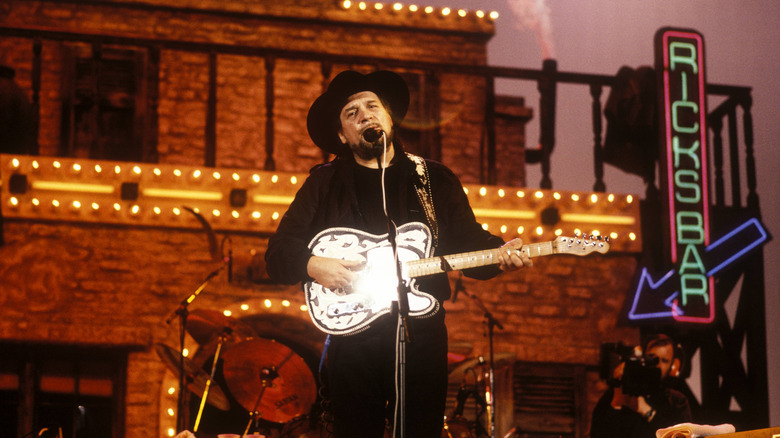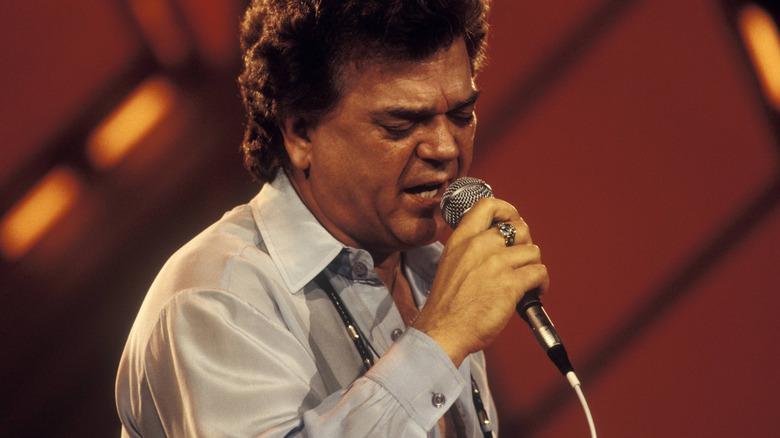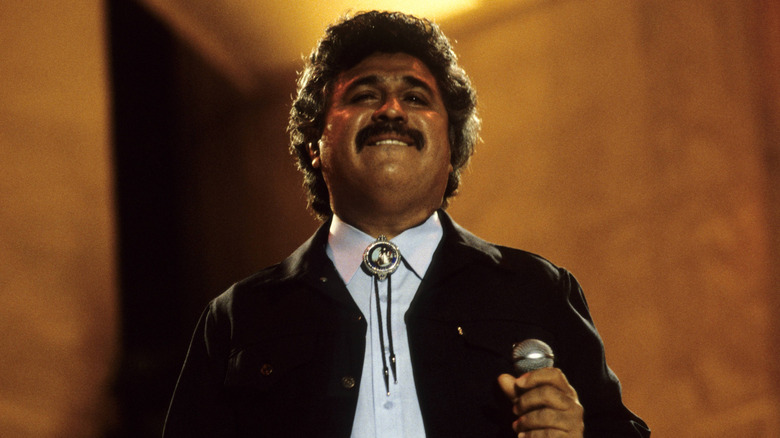Country Stars Who Were Poorer Than You Realized
People tend to think of chart-topping musicians as extremely well-off. For some of them, this is true, but having awards and platinum records doesn't always guarantee a lifetime of financial stability. There's something about being a hugely successful musician that seems to lead to taking their financial success and blowing it all up. There are famously lots of rock stars who are surprisingly poor, but this unfortunate pattern is not limited to just one genre. There are plenty of country stars who have woken up one morning and realized they are flat broke.
Some country stars just can't afford their lavish lifestyles, while others have suffered bad luck and hard times that have seen them lose everything. One of the good things about being a talented musician, though, is that if they survive the worst of it, they can come out the other side, have a career resurgence, and get their finances in better order. These are some of the country stars who were poorer than you realized.
George Jones
George Jones was the country superstar whom even other country superstars were in awe of. Waylon Jennings once told Spin magazine, "If everybody sounded like they wanted to, they'd all sound like George Jones." That talent and ability to connect with the listener through his emotional delivery and lyrics just made it all the more sad that, for most of his career, he was battling demons that would cause him to lose everything.
By the end of 1978, Jones could no longer hold things together. There was an arrest warrant out for him in Tennessee due to the $36,000 in child support payments he owed his ex-wife, Tammy Wynette. The bank was calling in a loan. He had nothing left of value to sell, having already hawked even his future royalty earnings for a pittance. There was also the $300,000 that courts had ordered him to pay promoters of shows that Jones hadn't bothered to show up for in the previous two years — 54 of them in total. With no way out of financial ruin, Jones filed for bankruptcy. His petition listed $1.5 million in debts against just $64,500 in assets. As the bankruptcy case unfolded, it was discovered that despite earning $2 million in the previous two years, Jones only knew what happened to $30,000 of it.
The country stars who so admired Jones tried to help him out. Willie Nelson, Linda Ronstadt, Elvis Costello, and more lent their talents to an album of duets with Jones.
Merle Haggard
The story of how Merle Haggard lost all his money is almost a cliche. He was a hard-drinking musician with a couple of divorces under his belt. He was riding high until suddenly he wasn't anymore. And the highs for Haggard had been exceptional. Between 1973 and 1976, all nine singles he released went to No.1. His career had the legs to last decades, and by 1990, he had 95 hit singles to his name. Over a third of them had topped the country charts.
He admitted to some creative accounting over the years: Once, the IRS sent an agent to Haggard's home to discuss what they felt were excessive business deductions. Haggard explained how he got inspiration from everything. "Finally, this fellow looks at me and says, "Why, Mr. Haggard, everything you do is a write-off,' and he started pointing out other things I should have declared," the musician told the Tampa Bay Times.
Despite this, by 1992, Haggard's money was gone. He filed for bankruptcy in December of that year — the same day his third wife gave birth to his sixth child. Regarding his decision to file for bankruptcy, Haggard told the Nashville Banner (via the Orlando Sentinel). "I think this is all for my benefit, to stand back and appraise things where nobody can touch me for a little bit. Hopefully, I won't be in there long." To settle his bankruptcy debts, Haggard sold the rights to 600 of his songs for $3 million.
Lorrie Morgan
Between 1989 and 1999, Lorrie Morgan had 14 Top 10 singles on the Billboard Hot Country Songs chart, including three that hit No. 1 and seven Top 10 albums. She continued to release music after that, but the biggest years of her career seemed to be behind her. Within a decade of her last Top 10 album, Morgan filed for bankruptcy.
She was in the middle of a divorce from her country star husband Sammy Kershaw — and he had filed for his own bankruptcy not long before she did. They were both tied to a failed chicken restaurant, and the lenders were calling in the loans. The IRS said they were owed money, too, and another bank said there were years-old outstanding loans unrelated to the restaurant. In a dramatic moment, Morgan's home was almost seized by U.S. Marshals, although a judge blocked this before she was barred from her own house.
Famously, 2008 was the year the Great Recession hit and destroyed many people's finances. Morgan knew she wasn't the only one hurting. In a statement, she said, "It's very important to me that my fans and business associates understand that I'm okay. Today's economic times have affected many American families and businesses. I, along with many of you, am not immune to this fact" (via The Hollywood Reporter).
It wasn't the first time Morgan found herself in financial trouble, however. In 1992, she filed for personal bankruptcy with $846,000 in debts, which she managed to pay back.
Randy Travis
Randy Travis has sold more than 20 million albums, had a whopping 16 No.1 hits on the country charts, and even managed a crossover No. 1 with Carrie Underwood, which topped the Billboard Hot 100 in 2009. Outside of his career, however, things were not looking great for Travis just a few years later.
The singer was arrested twice in 2012, including when he tried to buy cigarettes while drunk and naked. He was in the middle of an expensive divorce from his wife of almost two decades. Then, after suffering a stroke in 2013, he was unable to sing. By 2019, Travis was broke. In an attempt to improve his financial situation, he wrote a memoir. His co-author Ken Abraham told Taste of Country, "I think that is part of the story of Randy Travis that a lot of people don't know. They think that just because Randy has had such great success in the music business ... that he's just rolling in money and never has to have a concern. That's just not the way the music business works."
Still unable to sing and therefore unable to make back the fortune he once had, Travis has turned to generative AI as a possible way to restart his career. Label executive Cris Lacy told CBS News, "We started with this concept of, what would AI for good look like for us? And the first thing that came to mind was, we would give Randy Travis his voice back."
Waylon Jennings
The story of how Waylon Jennings lost all his money is especially tragic because he had been there for his good friend George Jones when Jones filed for bankruptcy in 1978. According to the Lubbock-Avalanche Journal, as soon as Jennings heard Jones was officially broke, he went to his friend's home and handed Jones a bag containing $26,000. Jennings had the money to spare. He not only had eight No.1 songs on the Billboard country chart by then, but had gotten an extra $25,000 out of his record company when they misinterpreted his stepping out of a negotiation to use the bathroom as him storming off because his demand had not been met.
Unfortunately, within a few years of helping out Jones, Jennings was $2.5 million in debt. A lot of that money was going to drugs. He told Spin, "I must have the constitution of 10 men, because right at the end I was doin' like $1,500 a day in cocaine." To avoid declaring bankruptcy, he began touring like crazy.
Another one of the ways Jennings tried to rebuilt his fortune was writing his autobiography, although he told the Las Vegas Sun that not writing the book might have made him more money if he'd been willing to screw over some old friends: "I could have owned Johnny Cash's and Willie Nelson's home by blackmailing 'em, but I didn't do that." The book did include stories about all the many times Jennings went broke, however.
Conway Twitty
Conway Twitty cared about his reputation, so owing people money was simply not an option. This became relevant after the country star tried to branch out into the fast food business ... and failed at it miserably. "What I know about is how to make records and how to sing songs, and I'm not too good at anything else, and Twitty Burger is a prime example," Twitty said (via UPI). The problem was that people he knew and cared about had invested in the business. After the Twitty Burger restaurant franchise went bust, the musician refused to leave them hanging and paid back all the investors personally. This took a lot of money, so he did what any good businessman would and wrote it off on his taxes.
The IRS didn't buy it. In the precedent-setting lawsuit, Jenkins vs. Commissioner ( Twitty's real name was Harold Lloyd Jenkins), the IRS argued that worrying about one's reputation as a down-home country star did not mean that using personal money to pay off debts could count as a business expense.
What makes this lawsuit so notable is how the judge's decision ended. Inspired by the presence of country music royalty, he decided to write some lyrics to sum up his decision in Twitty's favor, called the "Ode to Conway Twitty." The final line went, "Had Conway not repaid the investors/ His career would have been under cloud/ Under the unique facts of this case/ Held: The deductions are allowed" (via Tax Notes).
Tammy Wynette
Tammy Wynette's ex-husband George Jones filed for bankruptcy in 1978, with part of his debts being back payments he owed her for child support. A decade later, Wynette found herself in her own financial trouble. In 1988, she owed $900,000 to the government and an additional $1 million to various other creditors. There was disagreement among the parties involved over who was to blame and whether Wynette's bank had failed to keep accurate records of her loan repayments. "Tammy and I are merely the victims of people who are sharper with the pencil than she and I are," Wynette's husband George Richey said (via UPI).
When negotiations to settle her government debt fell apart, the U.S. Marshals came to take her house. Allegedly, they gave no warning that this was about to happen, and even waited until Wynette was out of town to move in. "We had been in negotiation with the [Federal Savings and Loan Insurance Corp.] attempting to resolve this," the singer's attorney Ralph Gordon told UPI. "We were shocked when we found out this morning that rather than attempting to further negotiate the matter, a U.S. marshal showed up to levy the house and property."
Over the next decade, Wynette was able to get her finances back in order enough that she had some money to leave when she died suddenly in 1998. But even in death, financial problems plagued her, as her daughters and Richey fought over who would inherit Tammy Wynette's fortune.
Freddy Fender
Freddy Fender started out making rock music in the 1950s, before his career was interrupted by a jail sentence. In the 1970s, he switched to making Tejano music and became a huge crossover success on the pop charts. "Music-wise, and art-wise, it was the best years of my life," he told the Los Angeles Times about that period. "But I didn't get the money. I did a lot of drinking and drugging, I didn't keep my eyes on the money, and like a lot of artists, I got ripped off."
If Fender claimed not to be wealthy despite his success, he would soon be flat broke due to a horrific tragedy. On the road in 1981, Fender's tour bus dropped him off and then continued on without him. Minutes later, the bus was in a horrible accident that killed his 39-year-old drummer, Joseph Lambert, and the 45-year-old driver, Joseph Parker. Already deeply in debt by that point, the resulting lawsuits bankrupted him.
He spent the rest of the '80s playing gigs for hardly any money. Then, in 1989, he helped form the Texas Tornados, a Tejano supergroup. Chart success and Grammy wins followed. "I'm not one to think like 'poor me,'" Fender once said (via Nu Country). "I've always accepted the ups and downs. Maybe I've had to start all over again a few times, but at least I'm not an old cup of stale coffee. I've had a few refills."
Willie Nelson
November 9th, 1990, was not a good day for Willie Nelson. Looking to claw back the $16.7 million in back taxes it claimed he owed after using illegal tax shelters for years, the IRS seized Nelson's assets across multiple states. While Nelson said that as long as he still had his guitar, he would be fine, his wife Annie D'Angelo told People, "I know he came off as super calm, but he wasn't that calm inside. We had two kids — it was super, super stressful. They seized our house. We were living in this little condo all four of us because Micah was a baby. It was frustrating."
One of the ways Nelson attempted to make money to settle his debts and avoid bankruptcy was by doing some Taco Bell commercials. More notably, he started recording new music. That's the story behind Willie Nelson's album "The IRS Tapes." Subtitled "Who'll Buy My Memories?," a portion of every sale went into the IRS's coffers.
Despite how hard he had to work to get himself out of the financial hole he found himself in, Nelson told Rolling Stone, "By the time everybody else heard about it, I was already on to other things. Mentally, it was a breeze. [The IRS] didn't bother me; they didn't come out and confiscate anything other than that first day, and they didn't show up at every gig and demand money. I appreciated that. And we teamed up and put out a record."
Shenandoah
While individual musicians going broke is hardly unusual, it is less common to hear of an entire band going bankrupt. That's what happened to Shenandoah, all thanks to the group's name. When the band signed with Sony Records, they had been performing under various names. A production company suggested Shenandoah and Sony approved it. But no one had thought to see if any other bands with that name already existed. Legal fights with four other bands over the rights to the group's name had drained all their finances.
Frontman Marty Raybon told Country Fever in 1994, "We went to the label and the production company and told them, 'we've got to have some help from y'all to pay these lawsuits, because it's taking everything we're making on the road. People who work with us have got to get a salary, and we have to have something to live on, too. Our show is not progressing because there are no funds to do it. We're not asking you to pay it all, just a third'" (via "Country Music: The Encyclopedia").
Although the naming debacle was allegedly the label's fault, they refused to contribute to the band's legal expenses. So, in the same year Shenandoah was nominated for a Grammy, the members were forced to file for bankruptcy. Since the bankruptcy voided their record contract, Shenandoah was free to move on and restart their career elsewhere, which they quickly took advantage of.
If you or anyone you know needs help with addiction issues, help is available. Visit the Substance Abuse and Mental Health Services Administration website or contact SAMHSA's National Helpline at 1-800-662-HELP (4357).










